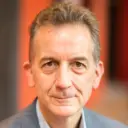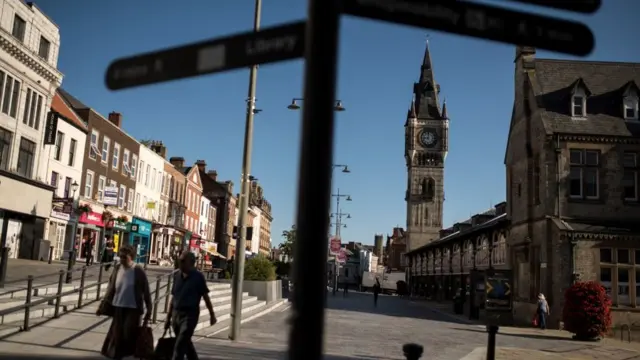Brexit: Why is Ireland bypassing Britain?published at 11:34 GMT 4 March 2021
Irish freight is being shipped directly to Europe to avoid Brexit bureaucracy.
Read MoreIrish freight is being shipped directly to Europe to avoid Brexit bureaucracy.
Read More Chris Morris
Chris Morris
BBC Reality Check
Million, billion trillion…
When the numbers get bigger and bigger, the words can start to sound the same.
But a billion is a thousand times bigger than a million. And a trillion is a thousand times bigger than a billion.
To put that into perspective, if a million seconds adds up to 11 and a half days, a billion seconds add up to 33 and a half years - and a trillion seconds? More than 33,000 years.
An awful lot, in other words. But in a modern economy we spend an awful lot.
If you take the total money spent on healthcare in the UK, it would, (according to the Office for National Statistics), take less than five years to spend £1tn.
Alternatively £1tn could buy you more than four million houses at the average UK property price, or fund more than 500 NASA missions to Mars.
 Reality Check
Reality Check
 Image source, Getty Images
Image source, Getty ImagesThere were several references to "levelling up" in Wednesday's Budget. It was also one of Prime Minister Boris Johnson's most-used terms of the 2019 election campaign.
The idea is that people and communities that feel they have been left behind get a chance to catch up.
So far, what it means in practice and if there's any way its success can be judged, is a bit vague.
Many organisations have put forward suggestions of things that need to be addressed such as employment rates, pay, health and formal education, but there seems to be fairly broad agreement that one of the central issues is the differences in productivity between regions - that's the amount of value created per hour worked.
 Reality Check
Reality Check
The chancellor has announced a government guarantee for first-time buyers, who will be able to take out a mortgage worth 95% of a property's value. The loans will be available for properties worth up to £600,000.
But Labour's Keir Starmer said the idea resembled the Conservative government's policy from 2013, which he said "fuelled a housing bubble, pushed up prices and made owning a home more difficult".
Under that policy, known as Help to Buy, potential homeowners who raised a 5% deposit could take out an additional loan for 20% of a property’s value, or 40% if they wanted to buy a house in London. By 2019, the government had funded around £12.5bn in equity loans, helping around 220,000 households to buy a home.
But some have argued that Help to Buy inflated the property market by increasing demand. According to Shelter, a housing charity, in its first two years, Help to Buy added around £8,250 to the average house price. And according to Shelter, the average person using Help to Buy was earning £50,000 a year, 85% more than the typical private renter.
 Reality Check
Reality Check
 Image source, Getty Images
Image source, Getty ImagesChancellor Rishi Sunak ended his Budget speech with a policy he said “exemplifies the future economy” – the setting up of freeports. These are special economic zones where a country’s normal tax and customs rules don’t always apply.
He said this was a policy “we can only pursue now that we are out of the European Union”.
This is a claim made by Boris Johnson several times in the past, which we’ve looked at before.
In fact, there are around 80 free ports in Europe and the UK had them until 2012. But supporters of free ports argue that they are more beneficial to the UK – after Brexit – because it is no longer tied to EU rules on state aid and subsidies.
It is true that the government will now have more flexibility, but the Brexit trade deal still requires subsidies to be justified, otherwise they could be challenged in UK courts. We’ve looked at that in more detail here.
The government says it wants the new freeports – and it has announced eight of them today - to be ‘national hubs for global trade and investment,’ with an emphasis on innovation.
But critics point out that that while they can benefit the areas where they are set up, they can divert investment from other areas and there is a risk of tax dodging and lower employment standards.
The government says it has listened to the criticisms carefully, and has adjusted its freeports proposal, external accordingly.
 Reality Check
Reality Check
Look out in the Budget for the chancellor’s plans on levelling up, which was one of the Conservative Party’s favourite terms from the 2019 election campaign.
The idea was that people and communities considered “left behind” would get a chance to catch up.
So far, what is meant by levelling up, or if there is any way its success could be tested, is a bit vague.
Research, external from the Institute for Fiscal Studies (IFS) found that: "On a wide variety of measures, regional disparities in the UK are greater than in most comparable countries."
But it also found that after adjusting for housing costs, living standards between regions were not particularly unequal.
Many organisations have put forward suggestions of things that need to be addressed such as employment rates, pay, health and formal education, but there seems to be fairly broad agreement that one of the central issues is the difference in productivity between regions - that's the amount of value created per hour worked.

Things such as infrastructure spending, investment in research and development, training and freeports are likely to be referred to as part of the levelling up agenda.
A herbal remedy has resurfaced that's said to "cure" Covid, but it's not been licenced as such.
Read MoreFigures for England and Wales suggest two-thirds of people who ask for self-isolation payments get rejected.
Read MorePresident Xi says China has achieved his poverty reduction pledge - but has it?
Read MoreMisleading claims about coronavirus vaccines have been spreading online.
Read More Reality Check
Reality Check
At Prime Minister’s Questions, Labour leader Kier Starmer said: “around three in ten people who should be self-isolating aren’t doing so.”
On Monday, he repeated this claim but said the opposite – that only three in ten people were self-isolating fully.
This latter claim is supported by data released by the Scientific Advisory Group for Emergencies (Sage), which advises the government on the pandemic.
It said that just 29% of people who had symptoms of coronavirus were full adhering to self-isolation rules., external It described this as “sub optimal”.
It’s difficult to get a precise figure on the amount of people who do self-isolate because they are generally based on surveys.
However, most of these surveys suggest the majority of people do not adhere to the full ten-day isolation period.
The government has said that £500 payments are available to support those who might face financial difficulties whilst self-isolating.
Again, there is no publicly-available data on this, but freedom of information requests to local councils have shown that the majority of people who apply are rejected due to the tough eligibility criteria.
 Reality Check
Reality Check
Speaking about the UK vaccination programme at Prime Minister’s Questions, Boris Johnson made this claim about the Labour leader, Keir Starmer: “One week he calls for us to go faster with rolling out vaccines when he would have stayed in the European Medicines Agency [EMA], which would have made that rollout impossible”.
We’ve covered this argument before and it’s a claim the Prime Minister has made repeatedly.
It’s clear that the UK has done a better job than countries in the EU in approving and distributing vaccines quickly. But the head of the UK’s own medicines regulator, the MHRA, has said the UK’s early approval was permitted under EU law.
If the UK had stayed part of the EMA (the EU’s medicines regulator), there would have been political pressure to go with the majority on both the approval and distribution of vaccines. But that was equally true in the past about other big issues, such as joining the euro, or the passport-free Schengen area. And the UK joined neither.
Staying in the EMA might have made it harder for the UK to act alone, but it wouldn’t have made it impossible.
In recent years there's been increasing use of a law which bans speaking out against the government.
Read MoreLockdown in England and Scotland will be lifted in stages - what are the risks associated with relaxing certain restrictions?
Read MoreSocial-media posts - some described as "scare stories" - are based on misunderstandings, experts say.
Read MoreFrozen wind turbines are being blamed for power failures - but problems with fossils fuels are a bigger issue.
Read MoreThe removal of news sites has led to concerns about the spread of disinformation.
Read MorePresident Biden has made a series of claims during his first four weeks - are they right?
Read MoreSouth Africa has started Covid-19 vaccinations after a delay to the original planned rollout.
Read MoreThe government says freight volumes to the EU are back to normal. What do the figures show?
Read More